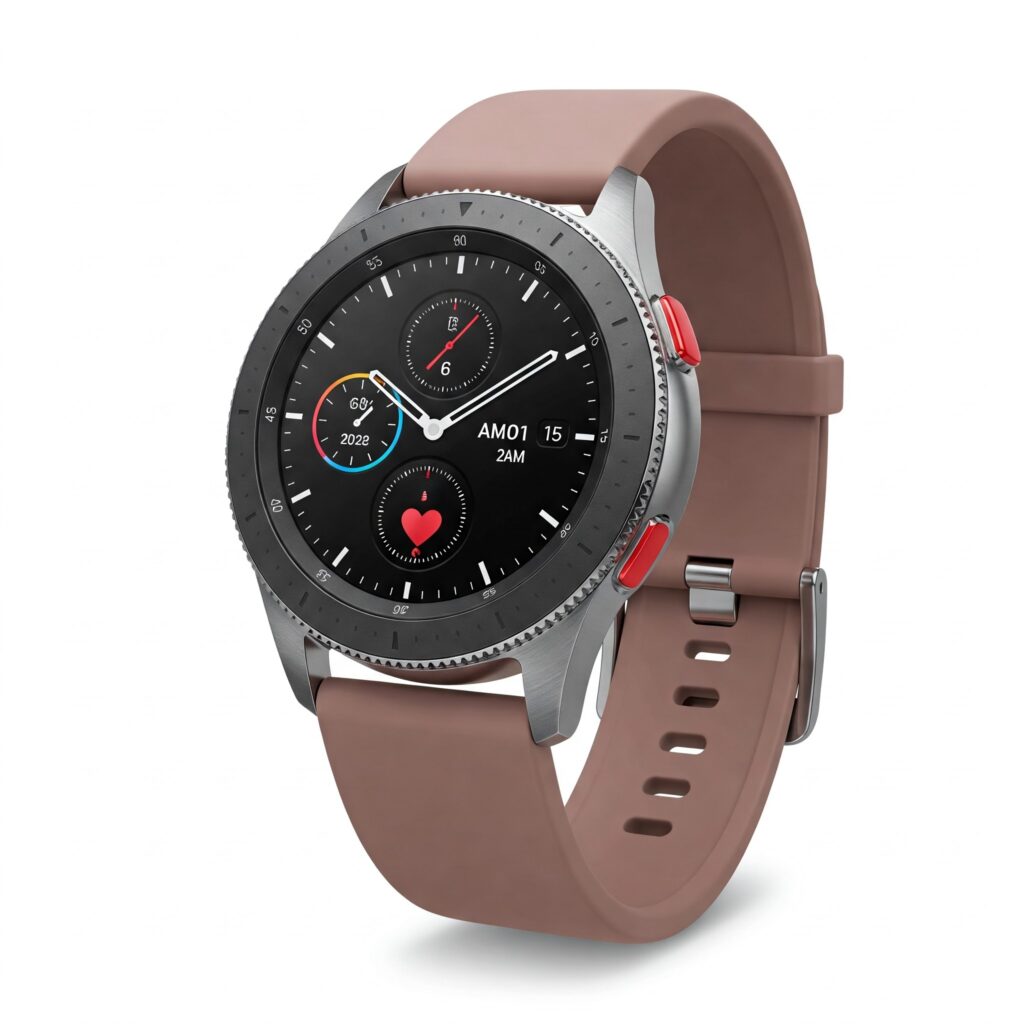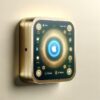Samsung Galaxy Watch 8: Unpacking the Potential of the 2025 Smartwatch
The anticipation for the Samsung Galaxy Watch 8 is building, fueled by the promise of significant upgrades in performance, health technology, and design. Expected to debut around July 2025, this smartwatch aims to solidify Samsung’s position in the competitive wearable market.
Key Anticipated Features & Insights:
- Next-Gen Performance: Rumors strongly suggest the use of the Exynos W1000 chipset, fabricated on a power-efficient 3nm process. This is a significant step up from the 5nm process used in the Galaxy Watch 7’s Exynos W930. This transition should result in an estimated 10-20% improvement in CPU performance and increased power efficiency, leading to snappier app launches, smoother multitasking, and potentially longer battery life. The RAM is also expected to be 2GB, consistent with the Watch 7, which should be sufficient for smooth operation.
- Revolutionary Health Tracking: The potential integration of a non-invasive blood glucose monitoring sensorremains a major highlight. While the exact technology is unconfirmed (rumors point to spectroscopic analysis), its inclusion would be a groundbreaking advancement, potentially allowing users to track glucose levels without the need for finger pricks. This would be a significant advantage over competitors like Apple and Google, who are also reportedly working on this technology.
- Design Evolution: While the classic round design is a Samsung staple, there’s strong speculation about a “squircle” design for the standard Galaxy Watch 8, potentially mirroring the look of the current Galaxy Watch Ultra. This could offer a more modern aesthetic and potentially a slightly larger usable screen area compared to a purely circular design of the same dimensions. Adding to the excitement, reliable sources indicate the return of the physical rotating bezel on a “Galaxy Watch 8 Classic” model. This beloved feature, absent in the Watch 7, offers a tactile and precise way to navigate the watch’s interface and is highly sought after by many Samsung smartwatch enthusiasts.
- Competitive Pricing: Staying in line with previous releases, the Galaxy Watch 8 is expected to start around the $300-$380 range for the Bluetooth/Wi-Fi models, with LTE variants commanding a premium of approximately $50-$100. This pricing strategy aims to compete directly with the Apple Watch SE and higher-end Fitbit devices.
Enhanced Connectivity & Compatibility:
The Galaxy Watch 8 will maintain broad compatibility with both Android (running Android 10 or later with Google Mobile Services) and iOS devices. However, as with previous generations, features like ECG and blood pressure monitoring might be restricted to Samsung Galaxy smartphones in some regions due to regulatory requirements. Expect the latest connectivity standards, including Bluetooth 5.3 and Wi-Fi 6 (802.11 a/b/g/n dual-band), for faster and more stable connections. LTE versions will also be available, providing standalone connectivity.
Immersive Display Technology:
The visual experience on the Galaxy Watch 8 is expected to be a refinement of the excellent displays found in previous models:
- Type: Vibrant Super AMOLED display for excellent color reproduction, high contrast ratios, and deep blacks.
- Size: Likely offered in multiple sizes, with the smaller variant around 1.31 inches and the larger around 1.47 inches, similar to the Galaxy Watch 7.
- Resolution: Sharp 432 x 432 pixels for the smaller model and 480 x 480 pixels for the larger, ensuring a pixel density of around 330 PPI, resulting in crisp and detailed visuals.
- Brightness: Capable of reaching 2000 nits peak brightness (as seen in the Watch 7), ensuring excellent legibility even under direct sunlight.
- Durability: Protected by a sapphire crystal layer for enhanced scratch resistance, a standard feature in Samsung’s premium smartwatches.
Key Display Features:
- Always-On Display: Conveniently view time and notifications without fully waking the screen, with minimal battery drain optimization.
- Highly Customizable Watch Faces: Access a vast library of watch faces through the Galaxy Wearable app and Galaxy Store, offering extensive customization options for style and displayed complications (widgets).
- Fluid Touch Response: Optimized touch sensitivity for smooth and accurate navigation within the Wear OS interface.
Why Consider the Galaxy Watch 8?
- Next-Level Health Monitoring: Building upon the already comprehensive suite (stress, body composition via BIA sensor, continuous heart rate monitoring, advanced sleep analysis with sleep stages and snore detection, ECG, SpO2, blood pressure monitoring – region dependent), the potential addition of non-invasive glucose monitoringwould be a significant leap forward. Expect further AI-powered insights within the Samsung Health app to help users understand their health data.
- Optimized Performance: The new 3nm Exynos W1000 chip promises a noticeable performance boost over the Watch 7’s W930, leading to faster app loading, smoother animations, and improved efficiency for longer battery life.
- Design Choices for Everyone: The rumored “squircle” design caters to modern aesthetics, while the potential return of the physical rotating bezel on the “Classic” model offers a familiar and functional navigation experience for loyal fans.
- Improved Power Efficiency: While the battery capacities are expected to remain similar to the Galaxy Watch 7 (around 300mAh for the smaller and 425mAh for the larger), the more efficient chipset and potential display optimizations could lead to a real-world increase in battery life, aiming to provide closer to 40-48 hours of typical usage for the larger variant.
- Robust Build Quality: Expect certifications like 5ATM water resistance, IP68 dust and water resistance, and MIL-STD-810H durability, ensuring the watch can withstand various environmental conditions.
- Deep Customization: The Galaxy Wearable app will continue to offer extensive personalization options, including a wide variety of watch faces, customizable complications, interchangeable 20mm bands, and potentially different case materials and finishes.
- Enhanced Ecosystem Integration: Enjoy seamless pairing and integration with Samsung Galaxy devices, including features like camera control, Find My Device, and more.
- Evolving AI Capabilities: Expect further integration of “Galaxy AI” features within the health and fitness tracking aspects, potentially offering more personalized insights and recommendations.
- Comprehensive Fitness Tracking: Track over 90 different workout types with automatic detection for many. Built-in GPS, GLONASS, Beidou, and Galileo support will provide accurate location tracking for outdoor activities.
Points to Consider Before Buying:
- Samsung Ecosystem Advantage: While compatible with iOS, features like ECG and blood pressure monitoring may be restricted to Samsung Galaxy devices in certain regions. Full functionality is always best within the Samsung ecosystem.
- Battery Life: While improvements are anticipated, heavy users who frequently use GPS, LTE, and the always-on display might still need to charge the watch daily.
- Official Confirmation Needed: The blood glucose monitoring feature and specific design elements are still based on rumors. Wait for Samsung’s official announcement for confirmed details.
Competitive Overview:
- Apple Watch Series 11: While rumored to feature a MicroLED display and potential blood pressure monitoring, its higher price point and exclusive iOS compatibility might make the Galaxy Watch 8 a more accessible and versatile option, particularly with the potential glucose monitoring and broader Android compatibility. The Galaxy Watch 8’s display resolution of 480 x 480 pixels (on the larger model) is comparable to the Apple Watch.
- Google Pixel Watch 4: While promising tighter Wear OS integration and potentially improved battery life, the Galaxy Watch 8’s established health tracking ecosystem, potential for groundbreaking features like glucose monitoring, and the option of a physical rotating bezel could give it a significant advantage for many users.
- Fitbit: While strong in basic fitness tracking and battery life, Fitbit devices generally lack the comprehensive smartwatch functionalities (like a full app store and LTE options) and advanced health sensors expected in the Galaxy Watch 8.
Breakdown:
The Samsung Galaxy Watch 8 is shaping up to be a highly anticipated smartwatch, potentially bringing significant advancements in health technology, enhanced performance, and thoughtful design choices. The rumored inclusion of non-invasive glucose monitoring and the return of the physical rotating bezel (on the Classic model) are particularly exciting prospects. If Samsung delivers on these expectations, the Galaxy Watch 8 could be a leading contender in the smartwatch market for 2025, appealing to a wide range of users seeking a powerful, versatile, and health-focused wearable. Keep an eye out for the official unveiling for the definitive details!
Empower Your Mind and Body: Wearable Wellness for a Balanced Life


